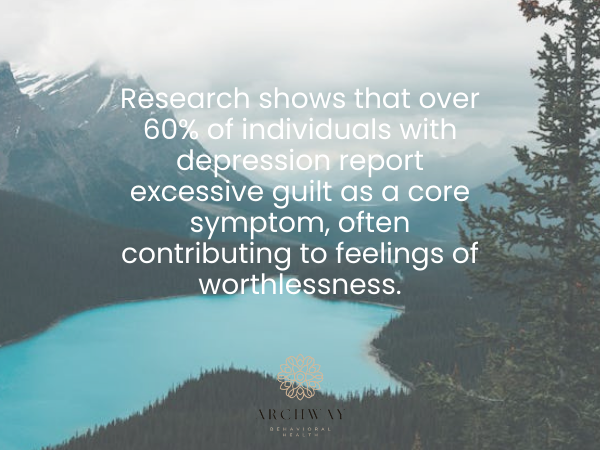Guilt is a deeply emotional and often debilitating feeling that many individuals struggling with mental health or addiction face. It is rooted in remorse for past actions, perceived mistakes, or harm caused to oneself or others. While guilt can serve as a motivator for positive change, it often spirals into self-blame and shame, hindering recovery.
To overcome guilt and regain control of your life, it’s essential to understand its impact, address its root causes, and seek the right tools and support. This blog delves into the strategies for managing guilt and highlights comprehensive treatment options, including Intensive Outpatient Programs (IOP), and evidence-based therapies such as CBT and DBT available at a Mental Health Treatment Center.
Understanding Guilt in Mental Health and Addiction
Guilt is a natural emotion that arises when individuals feel they have violated their personal values or caused harm. In mental health and addiction, guilt often manifests in the following ways:
- Regret Over Past Behavior:
- Substance use or addiction-related actions may have harmed relationships, career, or personal health.
- Self-Blame for Relapse:
- Individuals in recovery may experience intense guilt after a relapse, believing they have let themselves or their loved ones down.
- Perceived Responsibility for Others’ Pain:
- Many people struggling with mental health conditions feel guilty for how their symptoms affect their families or close relationships.
While guilt can motivate change, unresolved guilt becomes toxic. It fuels cycles of anxiety, depression, and self-destructive behaviors, creating significant barriers to recovery.
The Role of Guilt in Recovery
Guilt plays a significant role in the recovery process for individuals managing mental health challenges or addiction. It often stems from past actions, decisions, or behaviors that conflict with one’s values. In some cases, guilt can serve as a catalyst for positive change by motivating individuals to make amends and adopt healthier behaviors. However, when guilt becomes overwhelming or unresolved, it can hinder progress and perpetuate negative thought patterns.
In recovery, guilt may manifest as:
- Regret over strained relationships caused by addiction or mental health symptoms.
- Self-blame for not seeking help sooner or for relapsing after treatment.
- A sense of responsibility for the pain or disappointment caused to loved ones.
By addressing guilt constructively through therapy and support, individuals can transform it into an opportunity for growth and healing. Unpacking and processing guilt in a safe, supportive environment is crucial to breaking free from its grip and fostering emotional resilience.
Guilt vs. Shame: Key Differences
Although guilt and shame are often used interchangeably, they are distinct emotions with different impacts on recovery. Understanding the difference is critical for developing effective coping strategies.
- Guilt is a feeling of remorse about one’s actions. It is focused on behavior, such as thinking, “I did something wrong.” Guilt can be constructive when it motivates change or repair.
- Shame, on the other hand, is a feeling of inadequacy about oneself. It is focused on identity, such as thinking, “I am a bad person.” Shame is often destructive, as it undermines self-worth and fosters isolation.
In recovery, guilt can be addressed and resolved, whereas shame requires a deeper shift in how individuals view themselves. Therapy approaches like Cognitive Behavioral Therapy (CBT) and Dialectical Behavior Therapy (DBT) are effective in helping individuals reframe guilt and reduce shame by focusing on self-compassion and actionable change.
The Effects of Guilt
Unchecked guilt can impact both mental and physical health, making it critical to address during recovery.
Mental Health Effects:
- Increased anxiety and depression.
- Feelings of worthlessness or inadequacy.
- Fear of seeking help due to shame.
- Difficulty forgiving oneself, leading to emotional stagnation.
Physical Health Effects:
- Chronic stress can lead to sleep disturbances, fatigue, and headaches.
- Prolonged guilt can weaken the immune system and increase the risk of cardiovascular issues.
- Increased risk of substance use as a coping mechanism.
Strategies to Overcome Guilt
To effectively manage guilt, it’s important to develop healthy coping mechanisms and address the underlying causes. Here are actionable strategies to overcome guilt:
1. Acknowledge and Accept Guilt
The first step to overcoming guilt is acknowledging its presence. Suppressing guilt can lead to unresolved emotional distress. Accepting guilt as a natural response allows individuals to work through it without judgment.
2. Reframe Negative Thought Patterns
Guilt often stems from distorted thinking, such as assuming full responsibility for a negative event. Cognitive Behavioral Therapy (CBT) helps individuals identify these thought patterns and replace them with healthier, more accurate perspectives.
3. Practice Self-Compassion
Self-compassion involves treating yourself with the same kindness you would offer a loved one. Recognize that mistakes are part of being human and focus on what you can do to improve, rather than punishing yourself for the past.
4. Make Amends
For some, guilt stems from actions that hurt others. Making amends, whether through a heartfelt apology or repairing relationships, can help alleviate guilt and provide closure.
5. Focus on the Present
Guilt often anchors individuals in the past, preventing them from moving forward. Mindfulness practices, such as meditation, deep breathing, or journaling, encourage living in the present and reducing rumination. Dialectical Behavior Therapy (DBT) incorporates mindfulness as a key tool to process intense emotions like guilt.
6. Build a Support Network
Guilt thrives in isolation. Sharing your feelings with trusted friends, family, or a therapist can offer perspective and validation. Participating in Group Therapy provides a safe space to connect with others who have faced similar struggles, helping reduce feelings of isolation.
7. Set Realistic Recovery Goals
Rather than dwelling on past mistakes, focus on what you can control moving forward. Setting small, attainable goals—such as attending therapy sessions or practicing self-care—can create a sense of accomplishment and progress.
Treatment Options for Managing Guilt and Regaining Control
Professional treatment provides the structure and tools necessary to address guilt and its underlying causes. At a Mental Health Treatment Center, individuals can access tailored programs that include therapy, support groups, and holistic approaches to recovery.
1. Individual Therapy
Individual Therapy allows you to explore the root causes of guilt with a licensed therapist. This one-on-one setting fosters a deeper understanding of your emotions and equips you with strategies to process and move beyond guilt.
2. Group Therapy
In Group Therapy, individuals share their experiences and learn from others facing similar challenges. The support of a community helps normalize feelings of guilt and fosters a sense of connection and healing.
3. Partial Hospitalization Program (PHP)
A Partial Hospitalization Program is a structured treatment option for those needing intensive support. PHPs combine therapy, skill-building, and holistic care, addressing the emotional and physical toll of guilt and its related symptoms.
4. Intensive Outpatient Program (IOP)
An Intensive Outpatient Program offers flexibility for individuals who need comprehensive care but want to maintain their daily responsibilities. IOP incorporates evidence-based therapies like CBT and DBT, focusing on guilt management and emotional regulation.
5. Anxiety and Depression Treatment Programs
Guilt often co-occurs with anxiety and depression. Specialized Anxiety Treatment Programs and Depression Treatment Programs target these overlapping conditions, providing a comprehensive approach to recovery.

How CBT and DBT Help Address Guilt
Cognitive Behavioral Therapy (CBT):
CBT helps individuals challenge guilt-related thought distortions and develop healthier responses. Techniques include:
- Identifying triggers for guilt and reframing negative self-talk.
- Learning problem-solving skills to prevent future guilt-inducing situations.
- Developing confidence in decision-making and self-forgiveness.
Dialectical Behavior Therapy (DBT):
DBT emphasizes emotional regulation, distress tolerance, and mindfulness, making it an effective tool for managing guilt. Key DBT strategies include:
- Practicing radical acceptance to acknowledge and release past mistakes.
- Building distress tolerance skills to navigate intense feelings of shame or regret.
- Enhancing interpersonal effectiveness to repair relationships and set healthy boundaries.
The Importance of Forgiveness in Recovery
Forgiveness is a powerful tool for releasing guilt and regaining control during recovery. It involves letting go of resentment, whether directed at oneself or others, and creating space for healing and growth.
Self-Forgiveness:
Many individuals in recovery struggle with self-forgiveness, particularly when reflecting on the harm caused by their actions during periods of mental health struggles or addiction. Forgiving oneself involves:
- Acknowledging past mistakes without self-condemnation.
- Recognizing that no one is perfect and everyone deserves a chance to grow.
- Focusing on making positive changes moving forward.
Forgiving Others:
Holding onto resentment toward others can also block recovery progress. Forgiving others doesn’t mean condoning harmful actions, but rather releasing the hold those actions have on your emotional well-being.
Therapies like Individual Therapy and Group Therapy provide safe spaces to explore forgiveness, fostering emotional relief and a sense of closure. Forgiveness not only alleviates guilt and shame but also paves the way for rebuilding trust and relationships.
When Guilt Becomes a Barrier to Recovery
While guilt can motivate positive change, unresolved or excessive guilt can become a significant barrier to recovery. Toxic guilt often manifests as:
- Self-Punishment: Individuals may engage in harmful behaviors or sabotage their recovery as a way of “atoning” for their perceived wrongs.
- Avoidance of Help: Overwhelming guilt may cause individuals to withdraw from therapy, support groups, or loved ones, fearing judgment or rejection.
- Paralysis: Persistent guilt can lead to feelings of hopelessness and a sense that change is unattainable, which may result in giving up on recovery efforts altogether.
Signs that guilt is becoming a barrier include:
- Ruminating on past mistakes without resolution.
- Avoiding meaningful connections due to shame or embarrassment.
- Using substances or unhealthy coping mechanisms to escape feelings of guilt.
When guilt becomes toxic, professional intervention is essential. Programs such as Partial Hospitalization Programs and Intensive Outpatient Programs provide structured environments to help individuals process guilt and rebuild self-worth. Therapies like CBT and DBT are particularly effective in breaking the cycle of guilt, fostering healthier emotional regulation, and reinforcing positive behaviors.
Find Help at Archway
At Archway, we understand the profound impact guilt can have on your mental health and recovery journey. Our evidence-based treatment programs are designed to help you address guilt, rebuild self-worth, and regain control of your life.
Our services include:
- Individual Therapy for personalized care.
- Group Therapy to foster connection and support.
- PHP and IOP programs for intensive, flexible treatment.
- Specialized Anxiety and Depression Treatment Programs to address co-occurring conditions.
- CBT and DBT to provide practical tools for managing guilt and building resilience.
Our compassionate team is here to guide you every step of the way, offering a safe space to heal and grow. Take the step toward reclaiming your life and health—contact us at (888) 488-4103.
Frequently Asked Questions
Why do I feel so much guilt during recovery?
Guilt is common during recovery, often stemming from reflection on past actions or perceived mistakes. It’s a natural emotion but requires addressing to prevent it from hindering progress.
How can therapy help me overcome guilt?
Therapy provides a safe space to explore the root causes of guilt, challenge unhelpful thought patterns, and develop effective coping strategies through evidence-based approaches like CBT and DBT.
What is the difference between PHP and IOP?
A Partial Hospitalization Program offers structured, intensive care during the day, while an Intensive Outpatient Program provides flexibility for those balancing treatment with daily responsibilities.
Can guilt lead to other mental health issues?
Yes, unresolved guilt can exacerbate anxiety, depression, and low self-esteem, making it critical to address during recovery.
How can I start treatment at Archway?
Contact us to schedule an assessment. Our team will work with you to create a personalized treatment plan tailored to your needs and recovery goals.


